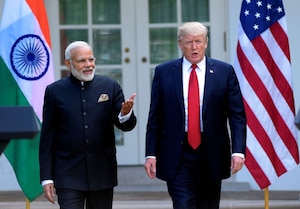G20 Energy Meet Ends Without Joint Communique Over Objections By Russia, China
The G20 Energy Transitions Ministerial meeting in Goa concluded without a joint communique after Russia and China raised objections to some points.

After the G20 Finance Ministers meeting, Agriculture group meet and Labour and Employment group huddle, the G20 Energy Transitions Ministerial meeting in Goa also concluded without a joint communique. The group has released an outcome document and Chair’s summary which is issued when a consensus is not arrived at. According to the statement, Russia and China had reservations on some points that hindered the group from reaching a common ground.
Russia Opposes Paragraph On Ukraine War
Paragraphs on the Ukraine war held Russia from agreeing to a consensus. The Chair stated that most members at the G20 Energy Transitions Ministerial meeting strongly condemned the Ukraine war and stressed it is causing immense human suffering.
The Chair also noted that most members expressed that the war was exacerbating existing fragilities in the global economy, constraining growth, increasing inflation, disrupting supply chains, heightening energy and food insecurity, and elevating financial stability risks.
It further added that Russia recognizes the status of this document as Chair’s Summary in particular due to the inclusion of Paragraph 27, in addition to paragraphs 21-26. Russia agrees with the rest of the text. Russia has expressed its distinct view on the situation in Ukraine, geopolitical tensions and sanctions during the meeting, the outcome documented noted.
"We reiterated our national positions as expressed in other fora, including the UN Security Council and the UN General Assembly," the outcome document said.
Notably, Union Minister of Power and New and Renewable Energy R K Singh was the chair of the meeting as India is holding the G20 presidency this year.
According to PTI, when asked about the issue at a press conference later, Singh said, "You must understand that different countries have their own natural sort of circumstances which shape their perspective on different questions."
"So, there you have reservations. The rule in G20 is that an issue is decided by consensus and by unanimity. If there is no unanimity and even one country has a different view it will go into the main document," he was quoted as saying by PTI.
On what was the main sticking point question, he said, "There are five-six paragraphs before you, go through them."
The chair’s summary in the outcome document said it is essential to uphold international law and the multilateral system that safeguards peace and stability.
The outcome document also mentioned UN “resolution No. ES-11/1 dated 2 March 2022, as adopted by majority vote (141 votes for, 5 against, 35 abstentions, 12 absent)” that “deplores in the strongest terms the aggression by the Russian Federation against Ukraine and demands its complete and unconditional withdrawal from the territory of Ukraine”.
The document said that “there were other views and different assessments of the situation and sanctions”.
“Recognising that G20 is not the forum to resolve security issues, we acknowledge that security issues can have significant consequences for the global economy,” it added.
ALSO READ | 'Russia And China Had Reservations': Sitharaman After G20 Meet Fails To Reach Consensus On Ukraine War
China Opposes Inclusion Of Geopolitical-Related Content
Apart from Russia, China also had concerns about the statements. It said that G20 is not the right platform to address security issues and opposed the inclusion of geopolitical-related content, the statement mentioned.
The outcome document said it is essential to uphold international law and the multilateral system that safeguards peace and stability. "This includes defending all the Purposes and Principles enshrined in the Charter of the United Nations and adhering to international humanitarian law, including the protection of civilians and infrastructure in armed conflicts," it said.
Meanwhile, on the threat of nuclear weapons, the outcome document read, "The peaceful resolution of conflicts, efforts to address crises, as well as diplomacy and dialogue, are vital. Today’s era must not be of war."
As per the document, the final summary failed to include language on the phase down of unabated fossil fuels and instead skirted around ambiguous language that include both the importance of phasing down unabated fossil fuels and that different approaches to manage emissions from the fossil fuel sector. It said that this is a step back from the Bali Leaders Declaration and the Bali Energy Transition Roadmap released in Indonesia last year.
Read Full Report Here View Pdf
Subscribe And Follow ABP Live On Telegram: https://t.me/officialabplive
Related Video
Breaking News: Trainer Aircraft Loses Balance Mid-Air, Crashes Near KP College in Prayagraj







































